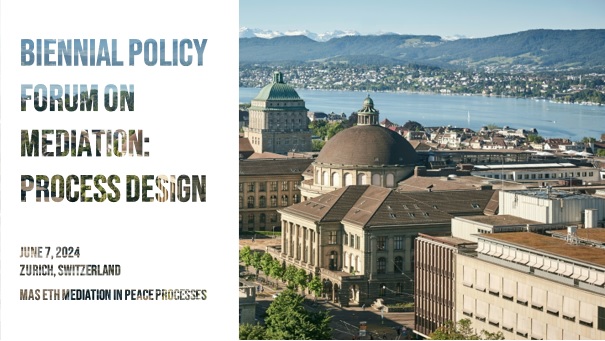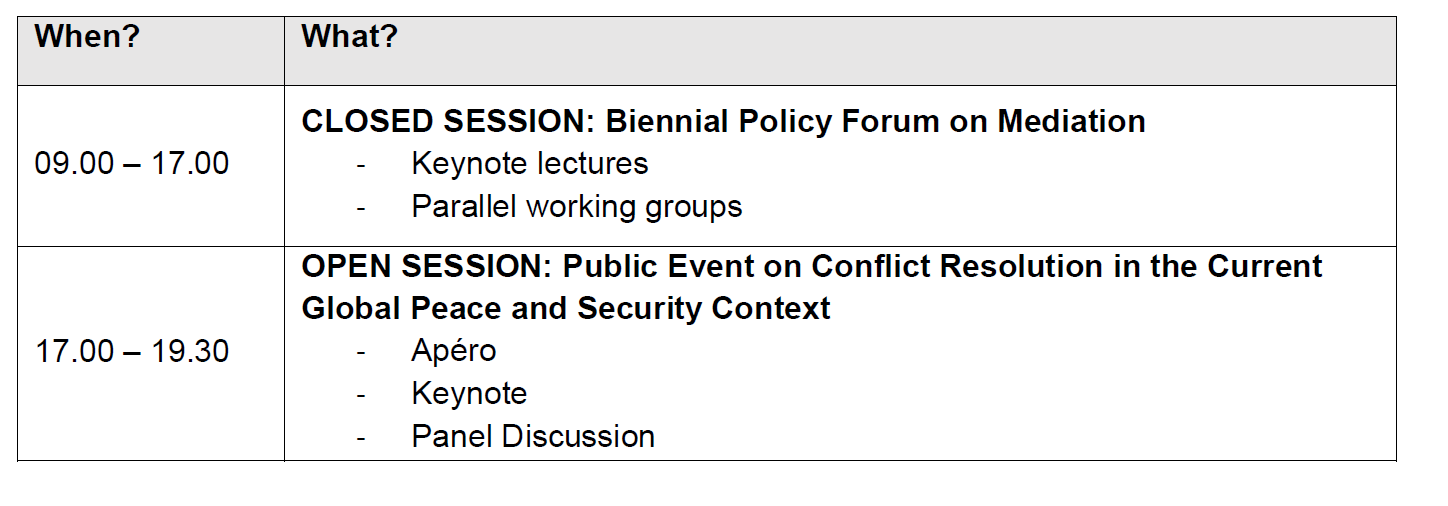Policy Forum 2024

Biennial MAS ETH MPP Policy Forum on Peace Mediation: Process Design
Overview
The MAS ETH MPP is a two-year postgraduate program for mid-career professionals involved in mediating violent political conflicts and supporting dialogue and peace processes globally. The program has the vision of contributing to a more peaceful and secure world by providing peace mediators with the knowledge, skills, techniques, and networks to effectively mediate violent political conflicts. The MAS ETH MPP is built on a close partnership between ETH Zurich and its key strategic partners, the Swiss Federal Department of Foreign Affairs, the United Nations (UN) and the foreign ministries of Germany and Finland.
On June 7, 2024, the MAS ETH MPP program will organize the third edition of its biennial policy forum on peace mediation. This year’s policy forum will focus on peace mediation process design, bringing together the MAS ETH MPP community of practice and invited experts for a full day of substantive discussions.
Objectives
The 2024 edition of the Biennial MAS ETH MPP Policy Forum on Peace Mediation aims to foster substantive exchanges and networking between mediation scholars, policymakers, and practitioners within the broader MAS ETH MPP community of practice. Substantively, the event aims to contribute to a better understanding and study of process design for peace mediation by:
- Offering fresh and innovative perspectives on key elements of process design;
- Studying how mediation processes were designed and re-designed in specific cases;
- Assessing the implications of the current global peace and security context on process design.
Finally, the event will also provide insights, cases, potential contributions, and fresh perspectives for a forthcoming book on process design by the Mediation and Peace Promotion Cluster at ETH Zurich.
Schedule and Format
The event will consist of an invitation only forum from 09.00 – 17.00, followed by an open session from 17.00 – 19.00.

Participation
The event will bring together mediation scholars and practitioners from around the world, including around sixty MAS ETH MPP program alumni and students. Registration is required for both the closed session during the day as well as the public session in the late afternoon. You can register for the public event HERE. If you are interested in attending the closed session during the day, please get in touch with MAS ETH MPP at to discuss further.
Speakers and Topics
The closed session will consist of a few keynote speeches on mediation process design and the current global peace and security context. Additionally, a few case studies will be discussed in detail. Finally, the closed session will include specific inputs on “fresh perspectives” to inform the event’s reflections on process design. These perspectives include the following:
- Innovative Designs for Third-Party Coordination
- Futures and Foresight in Mediation
- Balancing Acts: Designing Peace Processes Amidst External Military Involvement in Civil Wars
- Mediation in the Arab World
- Designing Communal Peace Processes in the Shadow of Climate Change
- Learning from Process Design in Indigenous Communities
- Time, place, and plot: Intersectional and Gender Analysis in Mediation Spaces
- Leadership and Process Design
- Braiding Knowledges: Designing Mediation Processes from both Indigenous and non-Indigenous Perspectives
- Mediating on the Digital Frontlines of Conflict
Below is a list of some of the speakers at the event. Please note that the list is subject to changes and further additions are likely as further speakers are confirmed.
Public Event: Conflict Resolution in the Current Global Peace and Security Context
- State Secretary Alexandre Fasel, Swiss Federal Department of Foreign Affairs
- Asif R. Khan, Director of Policy and Mediation Division, UN DPPA
- Stephanie Williams, Former Special Adviser on Libya to the United Nations Secretary General
- Itonde Kakoma, President of Interpeace
- Amb. Mohamed Ali Guyo, IGAD Special Envoy for the Red Sea, Gulf of Aden and Somalia
- Katia Papagianni, Director, Policy and Mediation Support, Centre for Humanitarian Dialogue
- Prof. Andreas Wenger, Professor of International and Swiss Security Policy; Director of Center for Security Studies (CSS); Program Director of MAS ETH MPP
Closed Session: Biennial Policy Forum
- Barney Afako, Commissioner on Human Rights in South Sudan
- Martin Albani, Head of Peace Mediation and Dialogue Sector, European External Action Service (EEAS)
- Prof. Cedric H. de Coning, Research Professor, Norwegian Institute of International Affairs (NUPI)
- Prof. Allard Duursma, Assistant Professor in Conflict Management and International Relations, ETH Zurich
- Dr. Gal Harmat, Associated Expert, swisspeace
- Fleur Heyworth, Head of Gender and Inclusive Security, GSCP
- Lorelei Higgins, Métis Canadian Cultural Mediator
- Joane Holliger, Senior Program Officer, Center for Security Studies (CSS), ETH Zurich
- Juan Jeannet Arce, Political Affairs Officer, Mediation Support Unit (MSU) of the Policy and Mediation Division in the UN Department of Political and Peacebuilding Affairs
- Prof. Ibrahim Fraihat, Associate Professor in International Conflict Resolution, the Doha Institute for Graduate Studies
- Sebastian Kratzer, Project Manager, Mediation Support and Policy, Centre for Humanitarian Doalogue (HD)
- Denis Matveev, Mediation and Dialogue Expert
- Dr. Julia Palmiano Federer, Senior Researcher, Center for Security Studies (CSS), ETH Zurich
- Volker Perthes, Former UN Under-Secretary-General, Special Representative for Sudan and head of UNITAMS
- Johanna Poutanen, Head of Women in Peacemaking and Digital Peacemaking, CMI – Martti Ahtisaari Foundation
- Christopher Thornton, Special Adviser, Centre for Humanitarian Dialogue (HD)
- David Vincent, South Sudan Peacebuilding Opportunities Fund
- Teresa Whitfield, Editor of “external pageStill Time to Talk: Adaptation and Innovation in Peace Mediationcall_made” Accord issue; former Director of the Policy and Mediation Division in the UN Department of Political and Peacebuilding Affairs
- Stephanie Williams, Former Special Adviser on Libya to the United Nations Secretary General
- Prof. Marie-Joëlle Zahar, Professor of Political Science, Université de Montréal; Member of the UN Standby Team of Senior Mediation Advisors.
